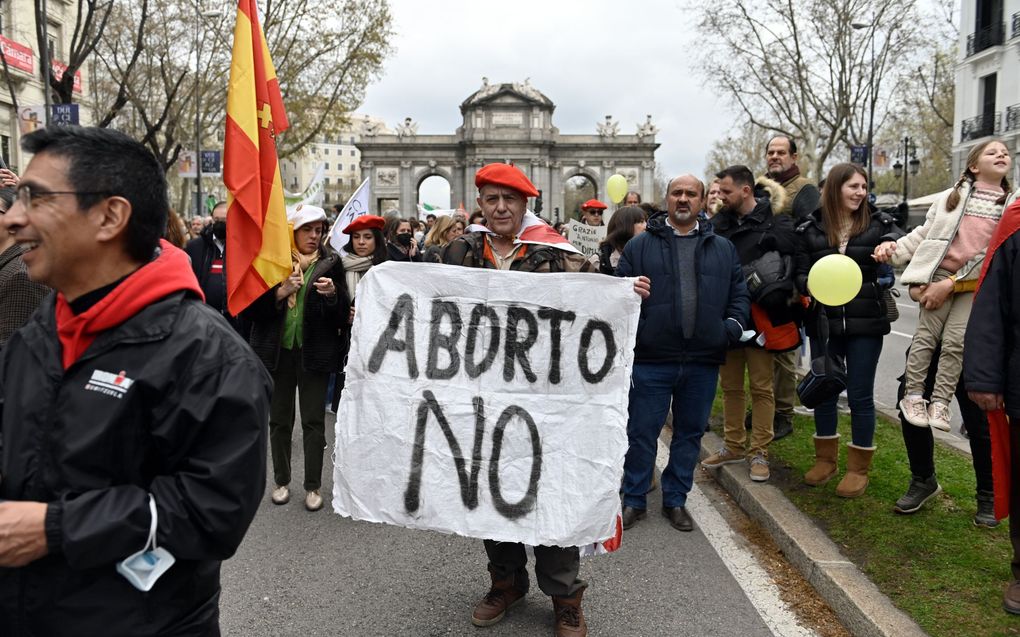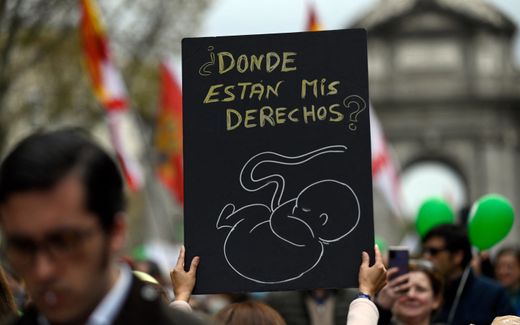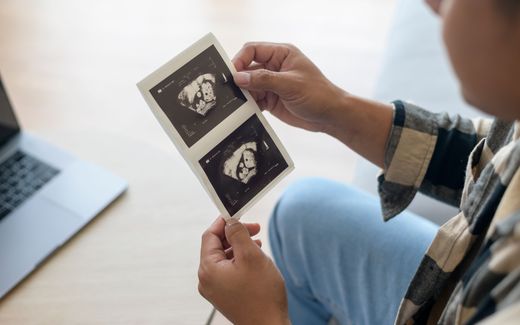EA in Spain: Abortion as human right is ‘barbaric’

A demonstrator holds up a sign that reads "no abortion" at an anti-abortion rally in Madrid, Spain. Photo AFP, DEL POZO CAÑAS
Western Europe
The government’s proposal to make abortion a constitutional right has left many Spanish Christians concerned.
The move to have abortion a national human right has been proposed by Prime Minister Pedro Sánchez and his party, Socialist Party of Spain (PSOE). It has been sent to the Cortes (Spanish parliament) and requested for review in early 2026.
In addition to enshrining abortion in its Constitution, Sanchez’s Socialist Party has also called to compile a list of doctors who refuse to perform abortive procedures.
Christian organisations such as Spain’s Evangelical Alliance (AEE) believe that if these proposals pass, it will create a society that more and more resembles “barbaric cultures.”
“To think that ending a human life is a fundamental right is characteristic of barbaric cultures more typical of antiquity. Every abortion is a failure of society, a painful event for the woman and those close to her,” the Alliance says in the statement.
The Evangelical Alliance has also called the proposals "demagogic" and a "contradiction in terms” and has released a statement on the announcement, according to an article on their website.
Pro-life activist Ana del Pino, who is the national coordinator for NEOS, a conservative organisation in Spain, says that abortion cannot be considered a constitutional right. Rather, the only real right is the right to life and human dignity.
“This is a universal truth: in no international treaty is there a so-called 'right to kill,' but rather an inalienable right to live. What must be done is to strengthen a culture of life and solidarity, where pregnant women are not pushed toward abortion out of fear, pressure, or lack of support, but are instead accompanied and encouraged to choose life with hope,” she says in a written statement to CNE.
Legal questions
Is it legal to make abortion a constitutional right in Spain? The Evangelical Alliance questions the legality should these proposals pass, as described in another [report on their website] (https://evangelicalfocus.com/europe/32688/the-abortion-debate-in-spain-reignites-with-the-government-denying-consequences-for-women). The lack of a parliamentary majority will likely not lead to an approval, and that it is a contradiction to include the measure in health-based Article 43, they say.
Juan Tello Mendoza, an Assistant Professor of Constitutional Law at the University of Barcelona, provides background into the government’s amendments on abortion within its constitution. He says that the government initially looked into reforming Article 15 which states the right to life and the guarantee of “physical and moral integrity”.
Since 1985, he says, the Spanish Constitutional Court has questioned whether the word "everyone" in Article 15 also includes the “nasciturus”, meaning “to be born,” ruling that it does not. However, the court acknowledged the nasciturus as a fundamental value deserving of some legal protection.
As a result, since the nasciturus was not considered a right-to-life holder, the parliament legalised abortion up to 14 weeks and beyond in cases where the mother’s life is at risk, in cases of rape, and when the fetus has severe mental or physical disabilities.
Then, 25 years later, the Socialist party wanted to see more legalisation, where abortions would be capped at 22 weeks in exceptional cases. Now, the same party wants to revisit abortion by making it a fundamental right, and they are looking to make that happen by reforming one of the articles within the nation’s constitution, he explains.
However, the current socialist government does not want to put the right of abortion within Article 15 because that would require 2/3 of each chamber to change the “fundamental rights” section of its constitution, he says.
For that reason, he also notes, they are now turning to Article 43 which outlines the right to health. Only 3/5 of the support is needed to change that. However, that Article is also located within another section that would not guarantee abortion as a “fundamental right” but only a principle that is covered by “ordinary judicial guarantees.”
And what about preparing a list of doctors who refuse to perform abortions? Tello Mendoza says that its publication would lack legal justification in many areas.
“In conclusion, Spain lacks a solid legal basis to impose mandatory registries of objectors beyond the internal declaration system already provided by LO 2/2010 (an internal declaration system). Such a measure would likely violate fundamental rights, data protection laws, and international human rights standards,” he says.
Post-abortion syndrome
Despite legal problems, political parties such as the PP Conservative party and the far-right VOX party have sounded the alarm on “post-abortion syndrome,” yet its existence remains in question by some medical authorities.
Post-abortion syndrome is characterised by the presence of psychological symptoms such as depression and anxiety after an abortion. Yet, according to the consensus from Sanchez’s political party, the syndrome is “non-existent” along with Popular Party mayor, José Luis Martínez-Almeida who also says that post-abortion syndrome is “not a recognised scientific category”.
Yet, the Evangelical Alliance does not believe this is the case and that adequate support is needed after an abortion.
The organisation also points out other discrepancies that are in need of addressing. Current abortion laws do not offer alternatives or options such as adoption, they point out. Additionally, women can visit the Health Ministry’s “I want to abort” page and be given names to abortion facilities but no support on possible doubts and consequences.
What is more, Sanchez wants to allow women to receive information on abortion from “scientifically based and internationally recognised” institutions such as the World Health Organisation (WHO) and the American Psychiatric Association (APA), according to reporting from the Spectator.
Regardless, Ana del Pino and her organisation believes that women deserve support, especially when they are facing a difficult pregnancy. Her organisation cooperates with networks that provide assistance such as housing and counselling. It is important, she says, that these women can make decisions that are “informed and full of hope”.
“Every life matters. Every woman deserves to be heard, respected, and supported. Our response will remain the same: presence, support, and hope. Because defending life also means defending women. There is no contradiction between the two; on the contrary, they are united in the same dignity—one we will never cease to protect,” she says.
Related Articles








